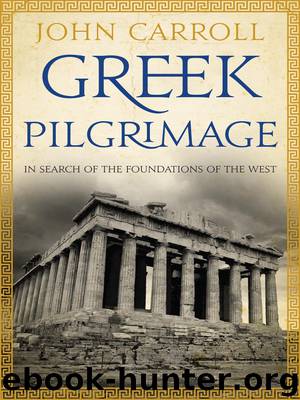Greek Pilgrimage by John Carroll

Author:John Carroll
Language: eng
Format: epub
Tags: ebook, book
Publisher: Scribe Publications
Published: 2010-10-23T16:00:00+00:00
Alexander the Great spent his brief life trying to bring back the heroic world of Achilles. The last flower of Hellenic greatness, there was a wild and manic desperation to his adulthood as he flashed — a brilliant, unforgettable star — across the stage of world history.
Alexander was born in 356 BC, nine years before the death of Plato. He came into the world four centuries after Homer (which is the same time difference that separates us from Shakespeare). His father, King Philip II of Macedon, brought Aristotle to his court to tutor the boy when he was twelve. Aristotle, at the time in his early forties, spent four years forming the young Alexander’s mind. At the age of twenty, Alexander became King of Macedon, following the assassination of his father. He would then rule for a mere thirteen years, dying of fever in Babylon in 323 BC. The empire he created included, in modern geographical terms, Greece, the Balkans north to the River Danube, Turkey, Syria, Lebanon, Israel, Egypt, Iraq, Iran, Afghanistan (and the various central Asian states to its north), Pakistan, and north-west India.
Alexander as a battle commander exemplified both bi and mtis. He led by example, fighting at the head of the Companion Cavalry, showing hair-raising and often near-fatal personal courage. The effect on the morale of his troops of his unstoppable volcanic fearlessness must have been infectious and immense — they loved their commander. The Duke of Wellington, a commander in Alexander’s mould, displayed bi during the long day of the Battle of Waterloo, when he kept riding to the hottest areas of fighting; the danger he placed himself in is reflected in the twenty aides-decamp who rode with him that day, most of whom were killed. One of his officers asserted, ‘We would rather see his long nose in the fight than a reinforcement of ten thousand men.’27
Alexander destroyed the Persian Empire under Darius in a sequence of three victories — Granicus in 334, Issus in 333, and Gaugamela on 1 October 331. Military historian Victor Davis Hanson judges Gaugamela ‘the most brilliant victory in the history of East–West confrontation’.28 On all occasions, the Macedonians were heavily outnumbered, which they expected and did not fear. At Gaugamela, Darius may have had 50,000 mounted troops, to Alexander’s 8,000.29 Alexander’s victories provided a worthy sequel to the Athenian defeat of a vastly superior force of Persians at Marathon in 490 BC, an association that was important to him.
Alexander’s strategy did not change. By the time of Gaugamela, Darius was well familiar with it, and the Persian king chose the field of battle on a plain to suit his own strengths — especially his chariots and elephants. He had amassed triple the number of Alexander’s horse and infantry, yet he still lost. He could not match the spirit of the Macedonian troops; their level of training, experience, and organisation; nor the tactics of Alexander, which depended on coolness in the heat of battle, and timing. Alexander knew that, if he could maintain rank and break the enemy as a cohesive whole, he would always win.
Download
This site does not store any files on its server. We only index and link to content provided by other sites. Please contact the content providers to delete copyright contents if any and email us, we'll remove relevant links or contents immediately.
The Gnostic Gospels by Pagels Elaine(2531)
Jesus by Paul Johnson(2362)
Devil, The by Almond Philip C(2331)
The Nativity by Geza Vermes(2230)
The Psychedelic Gospels: The Secret History of Hallucinogens in Christianity by Jerry B. Brown(2157)
Forensics by Val McDermid(2092)
Going Clear: Scientology, Hollywood, and the Prison of Belief by Lawrence Wright(1985)
Going Clear by Lawrence Wright(1967)
Barking to the Choir by Gregory Boyle(1821)
Old Testament History by John H. Sailhamer(1813)
Augustine: Conversions to Confessions by Robin Lane Fox(1772)
The Early Centuries - Byzantium 01 by John Julius Norwich(1744)
A History of the Franks by Gregory of Tours(1728)
A Prophet with Honor by William C. Martin(1725)
Dark Mysteries of the Vatican by H. Paul Jeffers(1720)
The Bible Doesn't Say That by Dr. Joel M. Hoffman(1680)
by Christianity & Islam(1632)
The First Crusade by Thomas Asbridge(1609)
The Amish by Steven M. Nolt(1573)
